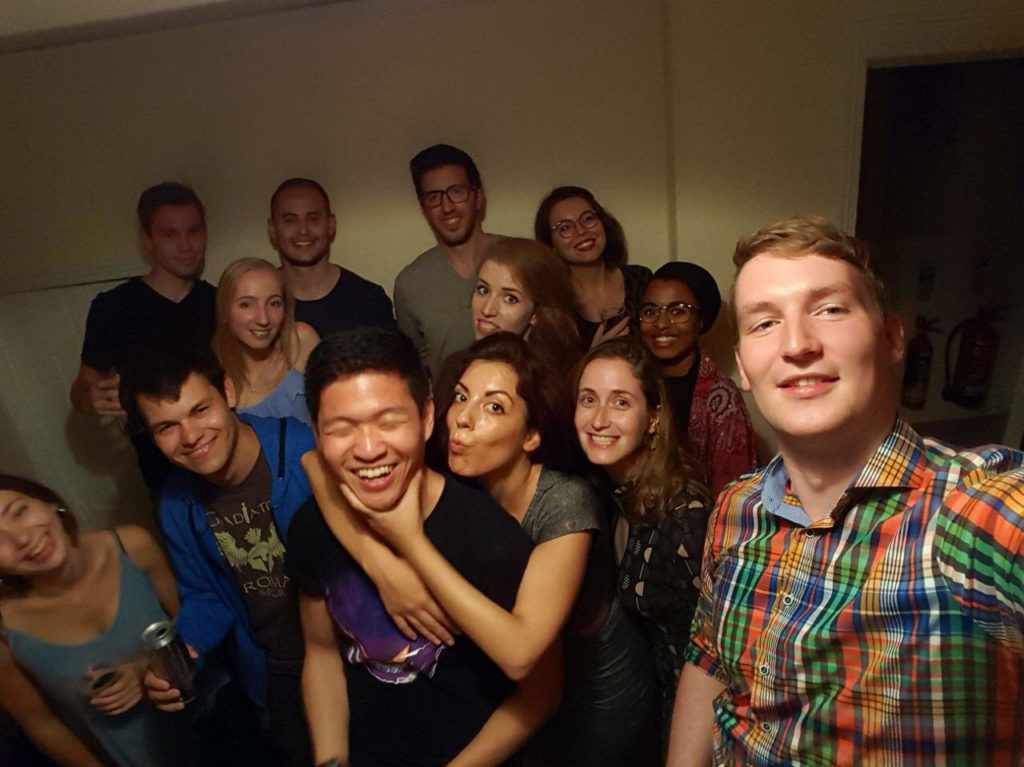In our Northern Roots series, we speak to readers originally from Northern Ireland but currently living elsewhere, or vice versa – or who’ve spent time away from NI. This week’s interviewee is Ani Kanakaki who is originally from Greece and currently living in NI. You can follow Ani on Twitter @kanakaki_ani.
1. Tell us about yourself. Where do you come from, and when did you come to Northern Ireland? What brought you here and what do you do now?
I was born and raised in Athens. I decided to take a career break to work on my dissertation. A friend suggested that I look for a short placement, so I did. I went online and I found a really inspiring project that I applied for. A few months after the Brexit referendum, I was in Belfast working for the Carnegie Oldpark project.
Back in Greece, there is nothing similar to the community sector here. Coming here, I had the opportunity to work with some of the most amazing people I’ve met. Seeing the impact of their work on people’s lives was a mind-blowing experience, so it didn’t take me long before I realised that this is what I wanted to do. I also felt very welcome here from the beginning, and that played an important role in my decision to stay.
Today, I am working as a Communications Officer for CENI, a charity that helps third sector organisations to prove and improve their impact. I’m still involved with the Carnegie Oldpark project, and I’m also working on a freelance basis as a Communications Consultant for small charities. When I am not working, you’ll find me volunteering with small grassroots organisations, rowing or devouring tray bakes.
2. What do you think of Northern Ireland, and how does it compare to where you are from?
Some parts of rural Northern Ireland remind me of the North West of rural Greece – a place where I spent the summers of my childhood at my grandmother’s house. It’s the only part of Greece that is notorious for its weather and the rain, so I was not as shocked by the weather here like most people think.
In other terms, I trace many similarities when it comes to history, politics and people. Rivalries and conflicts with short breaks of peace is a summary of our histories. Deprivation, immigration, attachment to cultural roots and tradition that often lead to division, with the help of mainstream politics exploiting those divisions as a way to divide and conquer.
In a more positive light, I love our big extended families, our bossy mums, the feeder nannies, our Sunday dinners, and the craic! In Northern Ireland, like in Greece, we live for the weekends and the craic!

3. Are you hopeful for Northern Ireland’s future? Does Brexit have any impact on you and how you view the future?
As far as concerns NI, I remain hopeful. People know that they can’t afford to return to the past. We are standing without a government the longest period of time of any country before and, yet, in the last local elections we noticed a shift towards more progressive politics. Under the current circumstances, that’s a bigger victory than we realise now.
I can’t speculate about the future, but I hope that the progressive agenda will gain more and more supporters and that will empower civil society. We need to realise that the only way to safeguard our democracy is by investing in our people and encouraging our communities to take ownership, responsibility and action. In my opinion, that’s the way to wash off the past to create a shared future. And, in the process of shaping up this shared future, I would like to see more non-Northern Irish getting involved.
This is a bleak moment for UK politics, and I believe that Brexit will have an impact on all of us. It seems that Brexit won’t affect people already living and working here, so in this aspect, it probably won’t have a direct impact on my residential status, but it will definitely impact me same as anybody living here. Brexit is not just a political issue – it already has vast socioeconomic implications and we can’t tell what else it may bring. Moreover, the UK has always been as a welcoming place, which sadly seems to be changing now.
4. Do you think you will return home or do you plan to stay in Northern Ireland long term? Is there anything that may influence your decision either way?
Northern Ireland is my home now. I wouldn’t change my life here for anything and the reason is the people. They are warm, welcoming and there is a sense of belonging that you can’t find anywhere else. So, I’m not planning to go anywhere as long as this place keeps my hope alive. If Brexit implications make it impossible for me to stay here, most likely you’ll find me in Donegal.
5. What can Northern Ireland learn from your home country?
Greece has a long history, but, as we know it today, is a very young country, with its own troubles. We suffered a civil war that, from my point of view, was worse than the Troubles. It was an armed conflict amongst people that were sharing the same identity to that point. It managed to break down not only the core of our new-born national identity, but also our communities, and even our families, leading to inconceivable atrocities. Worse than that, it created a political dipole around which we re-built what was left. Urbanisation, immigration and the new money that flooded the country after we joined the EU made us think that this chapter was over and that we had moved on.
Like the conflict here, the Greek conflict didn’t have a winner – both sides suffered terrible losses and peace was perceived as an unavoidable necessity. Peace and reconciliation are not the same thing. If you don’t forgive, you will never be able to move forward and build a shared future. And, in Greece, we failed to facilitate the dialogue that could address our trauma at the right time. Instead, the fear and mistrust passed onto the next generations who are often divided any time they have to face a challenge or a crisis.
The generations coming won’t have the same experiences, memories and what happened will be history. Northern Ireland hasn’t missed the train yet. This is the moment to win the fear before we create a legacy for the next generation that division is embedded in its identity.

6. If Northern Ireland had a president with sweeping powers, and it was you, what would you do?
I don’t believe in sweeping, because of its intrusive nature – I’m also obsessed with leaving everything tidy behind me, so I would like to see things replaced by others. I would like to replace fear, sectarianism and bigotry with love, hope and tolerance. Also, because I am a great believer in the power of education and the impact it can have in people’s lives, I would totally transform the educational system as we know it today.
7. What would you like to see more of on Northern Slant?
Often the media tend to group or categorise foreigners. We are immigrants, migrants, refugees, asylum seekers or we belong to a tradition or ethnic group, etc. This is not necessarily wrong, but often reproduces stereotypes and leaves us vulnerable and dehumanised. I want to see the Northern Roots series growing and giving voice to more of us. Let us tell our stories and show that we are not just a number. Sure, we are people that we might share a different identity, but we are here building our present and future as a living part of this society.
Working for an infrastructure body that supports community sector organisations to demonstrate and improve their impact, I have the opportunity to witness first-hand all the great work that is happening out there. I would like to see Northern Slant and all the local media create a platform that can help all the good stories to be heard – not for the sake of the sector, but for the sake of our communities. We deserve to celebrate the distance we have walked and need more optimism to stand up and grow.
8. If you could ask three politicians (one from Northern Ireland) out to dinner, who would they be and why?
I will try to keep it as local as possible because I have a huge list of politicians that I would like to ask out to dinner – and many on my list are not even alive anymore.
Definitely Tony Blair. Peace negotiations, Good Friday Agreement, Kosovo – probably one dinner wouldn’t be enough!
Arlene Foster, because I would like to observe her in a non-formal context.
And Gerry Adams – a dinner with no food, just whiskey. I would like to see how the conversation would progress through the process of drinking.
But realistically speaking, I would ask Malachai O’Hara, because I know him, I appreciate his views, and also because he’s great craic!

9. Do you have a favourite quote or mantra?
“Oh, aye” – that’s my mantra!
During working hours I get myself repeating way too often, “Can I have this wee scone, please?”
Or, after a night out stopping strangers, telling them “That’s us now”, asking them to score my Northern Irish accent between one and ten.
10. What’s your message for people back home?
If you feel you are you’re not in the right place, why don’t you give Northern Ireland a shot?!

